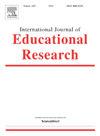“他们没有教我们需要知道的东西”:以色列青年活动人士挑战学校的气候变化教育
IF 2.5
3区 教育学
Q1 EDUCATION & EDUCATIONAL RESEARCH
引用次数: 0
摘要
这项研究考察了以色列青年参与气候行动主义的经历,重点关注学校在支持或阻碍他们参与方面的作用。该研究以社会运动理论为基础,考察了环境公民身份,并探讨了以色列年轻人如何看待学校在促进气候变化教育(CCE)方面的作用。采用定性现象学方法,我们对参与气候抗议的青年进行了19次访谈,并分析了他们学校的愿景陈述。调查结果揭示了年轻的气候活动家和他们的学校之间的脱节,他们认为学校在支持环境行动方面是无效的。学生们认为他们的学校在过时的框架下运作,无法应对环境挑战。作为教育系统的一部分,学校没有成功地为学生提供足够的资源、技能和情感支持,以有效地解决气候问题。研究结果表明,传统教育体系与参与气候变化的年轻人之间的分歧越来越大。这一趋势反映了学生的看法,即教育机构既不能作为气候倡导的有效合作伙伴,也不能提供有意义地承认他们对环境问题的空间。基于这些发现,我们建议以下政策措施:通过课程重组整合跨学科的CCE;建立青年参与校本环境决策的正式机制;为教育工作者提供CCE和生态焦虑支持方面的专业发展;在学校里为气候行动创造专门的空间;并建立认可系统,将环境参与作为合法的教育成果。实施这些变革将有助于弥合学校与参与环境保护的青年之间的差距。本文章由计算机程序翻译,如有差异,请以英文原文为准。
‘They don’t teach what we need to know’: Israeli youth activists challenge school climate change education
This study examined the experiences of Israeli youths involved in climate activism, focusing on the role of schools in either supporting or hindering their engagement. Grounded in social movements theory, the research examined environmental citizenship and explored how Israeli youths perceive the role of schools in promoting climate change education (CCE). Using qualitative phenomenological approach, we conducted 19 interviews with youths participating in climate protests and analyzed the vision statements of their schools. The findings reveal a disconnect between young climate activists and their schools, which they perceive as ineffective in supporting environmental action. Students viewed their schools as operating within outdated frameworks that fail to address environmental challenges. As part of the education system, schools do not succeed in providing students with adequate resources, skills, and emotional support to effectively address climate issues. The results suggest a growing divergence between traditional education systems and climate-engaged youths. This trend reflects students’ perception that educational institutions neither serve as effective partners in climate advocacy nor offer spaces that meaningfully acknowledge their environmental concerns. Based on these findings, we recommend the following policy measures: Integrate CCE across disciplines through curriculum restructuring; establish formal mechanisms for youth participation in school-based environmental decision-making; provide professional development for educators on CCE and eco-anxiety support; create dedicated spaces within schools for climate activism; and develop recognition systems for environmental engagement as legitimate educational outcomes. Implementing these changes would help bridge the gap between schools and environmentally engaged youth.
求助全文
通过发布文献求助,成功后即可免费获取论文全文。
去求助
来源期刊

International Journal of Educational Research
EDUCATION & EDUCATIONAL RESEARCH-
CiteScore
6.20
自引率
3.10%
发文量
141
审稿时长
21 days
期刊介绍:
The International Journal of Educational Research publishes regular papers and special issues on specific topics of interest to international audiences of educational researchers. Examples of recent Special Issues published in the journal illustrate the breadth of topics that have be included in the journal: Students Perspectives on Learning Environments, Social, Motivational and Emotional Aspects of Learning Disabilities, Epistemological Beliefs and Domain, Analyzing Mathematics Classroom Cultures and Practices, and Music Education: A site for collaborative creativity.
 求助内容:
求助内容: 应助结果提醒方式:
应助结果提醒方式:


